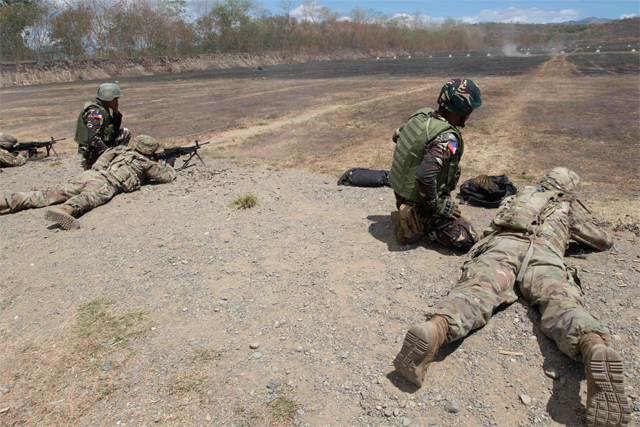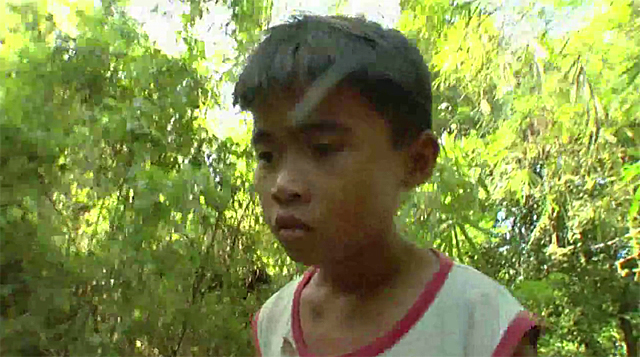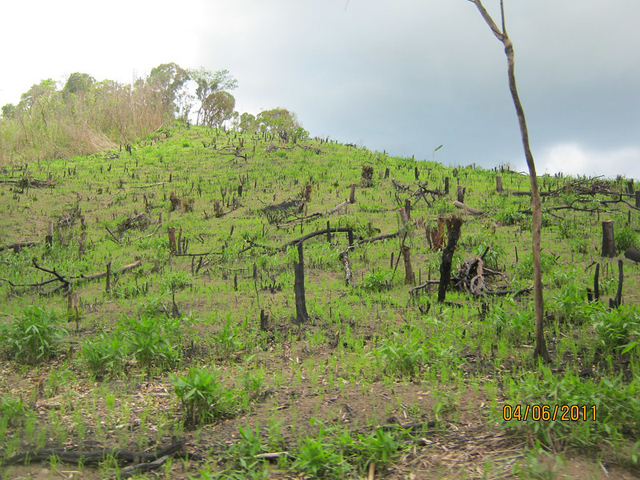Living conditions are difficult in sitio Danlog, a Buid community in southern Mindoro Island in the Philippines. The frequent violence perpetrated by Filipino soldiers makes it hard for the Buid to maintain their traditionally peaceful lives.

According to an article last week in Bulatlat.com, an alternative news source in the Philippines, the Buid and the other Mangyan societies are often in the cross-hairs of the military due to the activities near their villages of the communist guerrilla group the New People’s Army, or NPA. When the visiting journalist, Justin Umali, tried to get information about the violence, the responses he received from the Buid were mostly silence, muttered comments, or outright denials. Only one man, whom the journalist gave the pseudonym “Rey,” spoke up about what the army was doing in and around Danlog.
Rey said that he and his brother farm together planting palay and bananas, though they find growing the palay is difficult due to a lack of irrigation. In any event, it is not a staple of the Buid, so they only eat it in feasts and celebrations—and feed it to visitors. When the conversation turned to the military violence, Rey really opened up.
“They don’t respect us,” he said and added that when the army enters his land they run over his crops, especially the palay. Furthermore, the soldiers take personal belongings from the people without even asking. And they constantly ask the Buid if they have seen any NPA people around the area.
One day he was walking alone in Danlog when a group of soldiers confronted him. They suspected he was an NPA member. They tied him to a tree and began torturing him, determined to beat a confession out of him. When they finally realized he was not going to confess, they left, though he was still tied to the tree. Fortunately, someone came along and freed him.

Another time, soldiers seized his brother and demanded that he show them the NPA hideouts in the mountains around Danlog. After some fruitless searching, the soldiers gave up and beat his brother. When some soldiers started firing at a couple working on their farm one day, they enjoyed a hearty laugh when the farmers fled.
The Buid and the other Mangyan people are caught up in a counterinsurgency program called Oplan Kapanatagan. Last June, over 600 Mangyans fled for their lives to the lowlands to escape the bombing and strafing by the soldiers.
The Bulatlat report cites the opinion of a human rights group—Defend Southern Tagalog—that the violence is a result of corporate interests. The Santa Clara Power Corporation and the Intex Mining Corporation threaten the communities with environmental destruction and military occupation, the group argues.
Last October, the NPA reciprocated the violence. The group reported having carried out tactical offenses successfully quite near Danlog, in sitio Mantay in Monte Carlo and in sitio Amaling in Manoot. Confrontations between the army and the guerrillas have not occurred as yet right in Danlog.

Justin Umali covers other aspects of life in Danlog. He interviewed a woman named Ronalyn Ferrera who was willing to be quoted by name. She and her husband are both Ratagnon people, another Mangyan society in Mindoro. They have lived in Danlog for 20 years. He practices traditional slash and burn farming, called kaingin, to grow sweet potatoes and other root vegetables. She cares for their three children.
She describes conditions in the village as difficult at times, particularly when they need to leave the community but are unable to do so because there is no bridge across a river. Rey also complained about the difficulty of crossing the river in order to get in or out of Danlog. During the rainy season when the river water is waist high, travel in or out is almost impossible. When there is a medical emergency in the community, it can take up to two weeks to get help.
Nonetheless, the author concludes, the people of sitio Danlog remain hopeful. Rey observes that the Mangyans have lived there long before the soldiers arrived and they’ll still be there after they are gone. “As long as there are people who want to help us, we’ll manage,” he says.